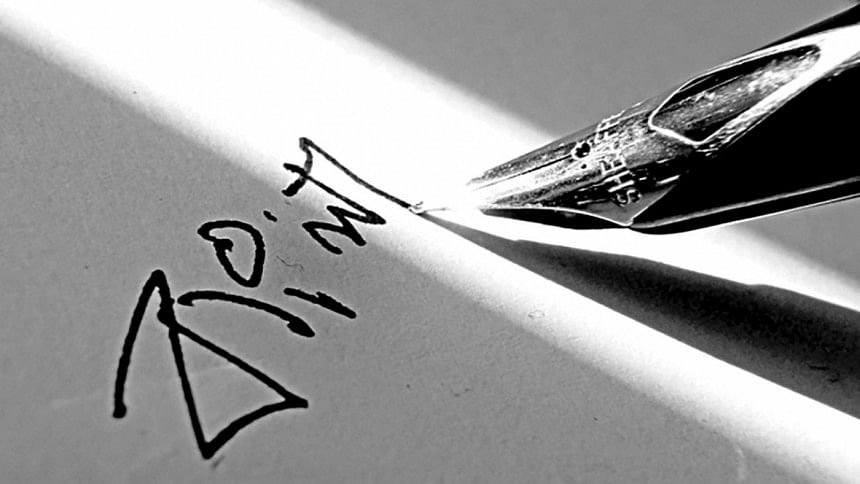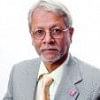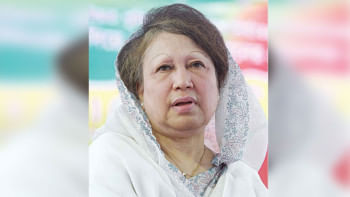Old words in new voices

It's a wonderful feeling, ascendency to almost ministerial heights, when you hear your old words in new voices, and more important, manoniyo at that.
I am not really the bragging sort, and you bear witness (hic), but recently some ministers, in fact two that I certainly know of, are talking in my language. Pardon me, shouldn't it be the other way round?
That is not to insinuate in any way that either of them collected my article (Oh no!), and did not have the decency to pen the credit line favouring me. Oh no, not that! In reality that is a distant possibility because my understanding is that politicians watch television that only portray them and only read printed material that depict them positively. Most ministers are conscious, imperceptibly so they think, about earning TV time and column inches.
Since my 2007 Chintito was about the misuse of Bangla in local radio as a language uttered, fat chance any of them even knew about my thoughts on the same topic. But, both have struck the right chord, having heard the wrong ones on radio and television.
Today is not the first time I am refraining from beating my own drum. The last time was 2012 when in my piece in this column "Distant Ripples Touch the Shores of Sanity" I was heartened to see that the government and the judiciary, as well as some others, were taking a laudable stance against the adulteration of Bangla by a section of our media about which I was chintito many moons ago; in fact not even in the month of February. On October 2007, the original Chintito was "Not much foorti on radio today".
In advocating my 10-year-old campaign, on January 20, State Minister for Information Tarana Halim instructed radio stations in the country to use Bangla that is suddho, "correct" somehow does not convey the complete sense. In a ministry note, she directed radio stations (in Bangla of course) not to present erroneous and corrupt Bangla and English in their programmes. She went somewhat further explaining that "Bangrezee", a weird cocktail of part-Bangla and part-English, using words such as "I know" and "You know" should be stopped.
Earlier on March 7 last year, championing my longstanding cause, Information Minister Hasanul Huq Inu told parliament, no less, in reply to a query that "the government has directed all private television channels and radio stations to form a preview committee to stop distortion of Bangla language and its pronunciation". Such a move was necessary because, "there are wide spread allegations that private radio stations and TV channels use incorrect words and distorted Bangla in the dramas and advertisements they broadcast".
And here are excerpts of what I wrote in 2007:
Eighty-eight or eighty nine, almost every single arjay has the similar sing-song theme, different names though, and to a great extent the same happy-don't-care attitude, and a highly anglicised accent, more or less.
To further the slow damage of our youth, some of these radio stations have a bizarre fascination for alien songs, Hindi, Urdu, English, you name it. Arrey Bhai! This is a radio station broadcasting from Dhaka. While applying for a government permit they must have committed to herald the culture of this timeless nation. They should have been granted the right to broadcast in this country based on their resolve to represent Bangladesh in mind, body and soul, in politics and culture, in news and views. One wonders the basis of their audacity and wisdom in ushering in quite unnecessarily tu agar kabhibhijaye...
If our local TV channels, so many of them, can successfully run for years, and flourish, without the aid of their bideshi counterparts, then why should these radios have to rely so much on hum-tum, and idhar-udhar? Can you imagine one single radio station in any of the SAARC countries, despite the brotherhood, to be even intermittently playing Bangla songs of Bangladeshi artistes? Unthinkable, taina! And here, a radio station does it as if they were broadcasting from the rooftop of some town in Maharashtra or a cave in NWFP. This is not on.
Foorti or not foorti, today or tomorrow, radio or TV, there is no reason whatsoever to play alien songs as a routine on our local radio stations. That is not why this nation has sacrificed so much for so long. That is not why the government of Bangladesh granted the broadcasting license. This is the time to rectify. Please.
And, in 2012 I was pleased to write:
The High Court in a suo moto rule (February 16, 2012) directed radio and television channels not to use distorted Bangla or foreign languages in Bangla broadcasts. The HC bench also issued a rule upon the government to explain why it should not be directed to take necessary steps against the distortion of Bangla language or use of foreign languages in Bangla programmes on the radio and TV channels. Besides, the court asked the government to explain why it should not be ordered to take legal action against those responsible for distorting the mother language and to cancel the licenses of the radio and TV channels airing such programmes.
I was humbled then, for the ripples caused by the drumbeats of my 2007 column against the distortion of our mother tongue by a section of the media had finally touched the shores of sanity. Joy Bangla!
About one hundred years ago, Gopal KrishnaGokhale, a prominent Indian socio-political leader said, "what Bengal thinks today, India thinks tomorrow." However, that is not relevant as both the ministers and I are from Bengal.
However, please allow me to conclude today with the words, what Chintito thinks today…
Dr Nizamuddin Ahmed is a practising architect, a Commonwealth Scholar and a Fellow, a Baden-Powell Fellow Scout Leader, and a Major Donor Rotarian.
Image used under a Creative Commons License.





Comments